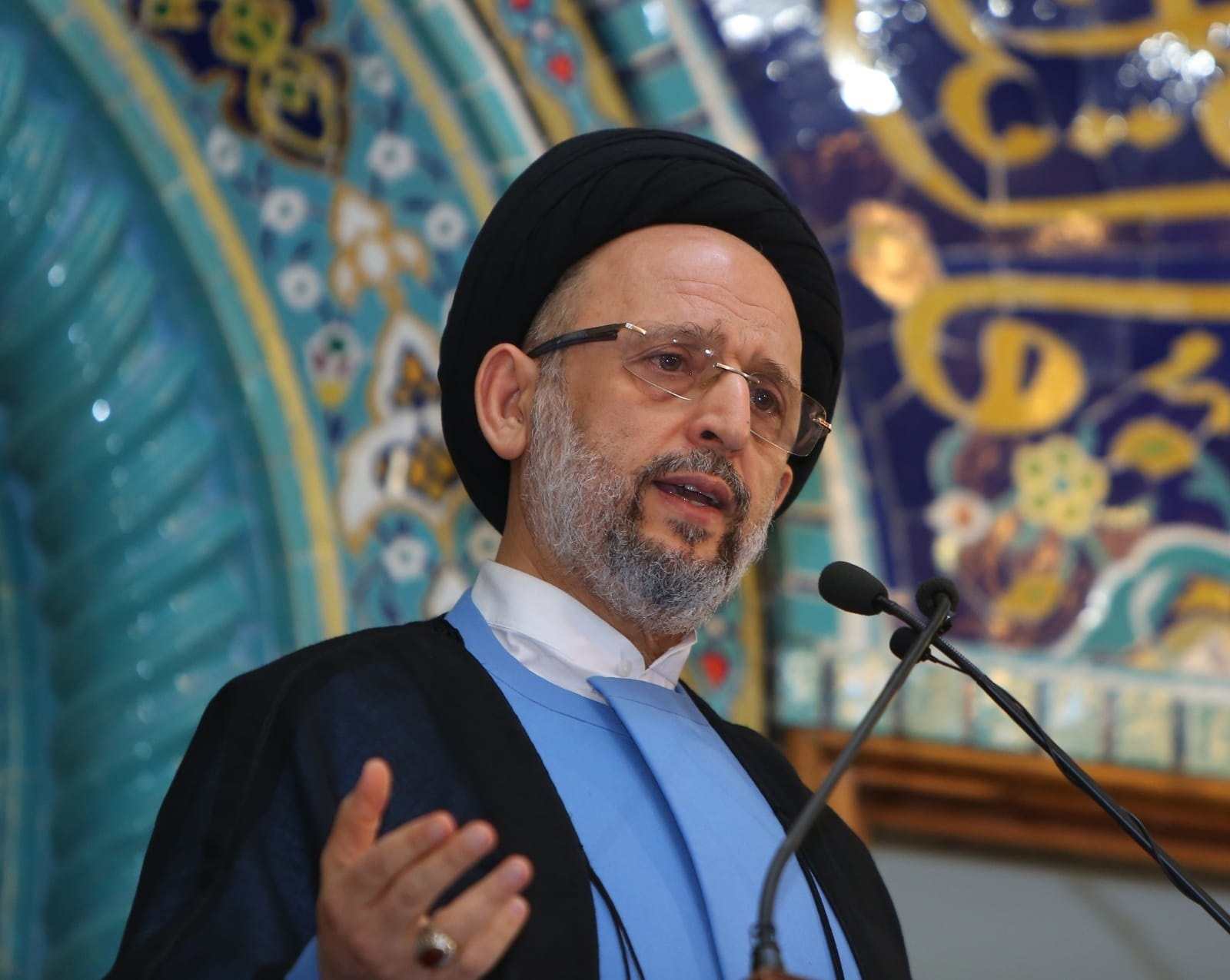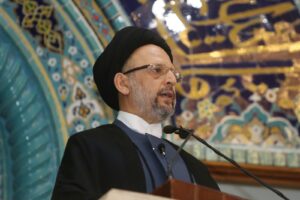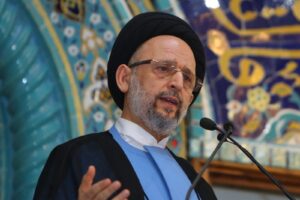The first sermon In the name of Allah, the Compassionate, the
His Eminence, Sayyed Ali Fadlallah, delivered the two Friday prayer sermons at the Imamain Al-Hassanain Mosque, on Zul Hijja 24, 1446H/ June 20, 2025. Several prominent religious scholars, dignitaries and hundreds of believers attended the Jumu’a prayer. Following is an edited summary of the sermons
The first sermon
In the name of Allah, the Compassionate, the Most Merciful
The Islamic Method of Dialogue
Allah, the Most Exalted, says in His Glorious Book:
“The truth is from your Lord, so do not be among those who doubt. If anyone disputes with you concerning it after knowledge has come to you, say, ‘Come, let us call our sons and your sons, our women and your women, ourselves and yourselves, then let us pray earnestly and invoke the curse of Allah upon the liars.’ —God, the Most Exalted, has spoken the truth.
On this day, the 24th of Zul al-Hijjah in the tenth year of Hijrah, we recall a significant event in Islamic history—the day Prophet Muhammad (p.) engaged in Al-Mubahala with the Christians of Najran, which at that time was a major center for Christianity in the Arabian Peninsula.
This happened after the Prophet (p.) sent a letter to the bishop of Najran, inviting him to meet in Madina, affirming the importance of dialogue among heavenly religions. The Prophet (p,) began the letter saying:
“In the name of the God of Abraham, Isaac, and Jacob, from Muhammad, the Messenger of Allah, to the Bishop of Najran and its people.”
He then recited:
“Say, O People of the Book, come to a common word between us and you, that we shall worship none but Allah, and associate nothing with Him, and that none of us shall take others as lords besides Allah...”
The Prophet added:
“I call you to worship Allah instead of worshiping His servants, and I call you to the guardianship of Allah instead of the guardianship of His servants.”
The bishop of Najran accepted the invitation and sent a delegation of sixty of the most prominent church leaders. The Prophet (p.) welcomed them in his mosque in Madina, which reinforces the jurisprudential opinion that there is no objection to People of the Book entering mosques.
During their meeting, the Prophet clarified that his message was a continuation of the divine messages that came before him; he did not come to abolish them but to correct distortions that had occurred. He conveyed what Allah instructed:
*”Say, we believe in Allah and what has been revealed to us, and what was revealed to Abraham, Ishmael, Isaac, Jacob, and the Tribes, and what was given to Moses and Jesus and the Prophets from their Lord. We make no distinction between any of them, and to Him we submit.”
The Prophet also emphasized that the prophets were human beings, honored by carrying the divine message to people, as confirmed when he said:
“I am but a human being like you.”
The same applied to Prophet Jesus (a.s.), who declared in the cradle:
“Indeed, I am the servant of Allah. He has given me the Scripture and made me a prophet. He has made me blessed wherever I may be and has enjoined upon me prayer and charity as long as I live. And He has made me dutiful to my mother and has not made me arrogant or miserable.”
The head of the Christian delegation responded:
“But we believe he is the son of God. If he is not, whose son is he?”
The Prophet (p.) recited:
“The Messiah, Jesus son of Mary, is only the Messenger of Allah, His Word that He conveyed to Mary, and a Spirit from Him.”
Allah’s power was shown in his miraculous birth without a father, similar to Adam, as Allah says:
“Indeed, the example of Jesus to Allah is like that of Adam. He created him from dust, then said to him, ‘Be,’ and he was.”
If Jesus’ birth without a father means he is the son of God, then Adam would have more right to that, as he was created without a father or mother.
The delegation leader asked:
“If Jesus is only a servant of God and a human being, how did he revive the dead, heal the blind and the leper, and tell people what they eat and store, which only someone divine can do?”
The Prophet (p.) explained that these were miracles, as with other prophets, shown by God’s will to prove their truth. God repeatedly emphasized that Jesus’ miracles were by His permission:
“And \[make him] a messenger to the Children of Israel \[who will say], ‘Indeed I have come to you with a sign from your Lord, that I will create for you from clay the shape of a bird, then I will breathe into it, and it will become a bird by permission of Allah. And I will heal the blind and the leper, and I will revive the dead by permission of Allah, and I will inform you of what you eat and what you store in your homes. Indeed in that is a sign for you, if you are believers.'”
The dialogue continued, with the Prophet presenting clear proofs, but the delegation refused to accept the truth he called for.
Seeing that the dialogue had reached a deadlock, the Prophet invited them to Al-Mubahala, as commanded by Allah:
“If anyone disputes with you concerning it after knowledge has come to you, say, ‘Come, let us call our sons and your sons, our women and your women, ourselves and yourselves, then let us pray earnestly and invoke the curse of Allah upon the liars.'”
The Christians were surprised by the Prophet’s proposal but agreed, saying:
“You have been fair, O Abu al-Qasim, as Al-Mubahala will show the truth …”
Later, they deliberated, and their leader advised:
“See who he brings with him. If he brings many, it’s a show of force; but if he comes only with his closest family, as prophets do, then do not engage in Al-Mubahala, for it proves his sincerity.”
The next morning, as people gathered, the Prophet appeared holding Al-Hussein (a.s.), leading Al-Hassan (a.s.) by the hand, followed by Ali and Fatima (a.s.).
The Prophet said to them:
“When I pray, you say Amen,”* then raised his hands and prayed:
“O Allah, these are my family.”
When the Christians saw that the Prophet came only with these individuals, their leader urged them to withdraw from the Mubahala. Instead, they agreed to maintain their religion while respecting the Islamic state’s system, contributing to its defense, and preserving their rights to belief and worship, in line with how Islam treats all heavenly religion
Dear beloved ones, this incident affirms two principles:
- Islam seeks relations with Christians based on common faith, dialogue, and respectful debate, as Allah says:
And do not argue with the People of the Book except in the best manner.
- Al-Mubahala, when dialogue fails, allows both sides to entrust the matter to God to expose falsehood, reducing tension in disputes.
This event highlights the status of Ahl al-Bayt:
Al-Hassan and Al-Hussein are the Prophet’s sons
Fatima (a.s.) is the leader of women
Ali(a.s.) is regarded as the Prophet’s own self
This corresponds to the verse:
“Come, let us call our sons and your sons, our women and your women, ourselves and yourselves…”
Followed by the purification verse:
“Indeed, Allah desires to remove all impurity from you, O People of the House, and to purify you completely.”
May Allah guide us to follow the path of the Prophet and Ahl al-Bayt, protecting us from misguidance and deviation.
The Second Sermon
In the Name of Allah, the Compassionate .the Most Merciful
Worshippers of Allah, I urge you and myself to reflect upon the verses revealed on the 25th of Zul al-Hijjah:
*”Indeed, the righteous will drink from a cup \[of wine] whose mixture is of camphor, a spring from which the servants of Allah will drink, making it gush forth abundantly. They fulfill vows and fear a Day whose evil will be widespread. And they give food out of love for Him to the needy, the orphan, and the captive, saying, ‘We feed you only for the sake of Allah. We desire neither reward nor thanks from you. Indeed, we fear from our Lord a Day that is severe and distressing.’ So Allah will protect them from the evil of that Day and grant them radiance and joy, and reward them for their patience with Paradise and silk garments.” —God, the Most Exalted, has spoken the truth.
The reason for this revelation is when Al-Hassan and Al-Hussein (a.s.) fell ill. The Prophet (p.) visited them, and people suggested to Ali(a.s.) to vow something for their recovery. Ali, Fatima, and their maid Fiddah vowed to fast three days if the children recovered. They fasted, and despite hunger, they gave away their meals each evening to a needy person, an orphan, and a captive, respectively.
We must embody this value — supporting orphans, the poor, and the vulnerable — as a way to express love for Ahl al-Bayt, strengthening our society to face challenges together.
The ongoing Israeli aggression on the Islamic Republic of Iran are not only about preventing nuclear capability but retaliating for Iran’s support for the Palestinian people, aiming to weaken Iran militarily, economically, and politically, and destabilize its regime.
Despite Iran’s openness to negotiate on its peaceful nuclear program, the Zionist entity, with over 200 nuclear warheads, continues aggression. This escalation has become more dangerous with the U.S. president threatening direct involvement and even targeting Iran’s Supreme Leader — a reckless violation that does not take into consideration his status not only in Iran but also in the entire Islamic world. The Zionist enemy believed it could achieve the goals of this aggression by assassinating military, security, and scientific leaders, to push Iran to surrender and accept the dictates and conditions imposed upon it. However, the strong response from the Islamic Republic came to affirm to all concerned that it is not easily subdued, and that it is capable of repelling this aggression and preventing it from achieving its objectives, armed with its faith, the cohesion of its people, and their steadfastness, which proves daily their support for their leadership and military and security forces, despite all the wounds that have bled and the magnitude of the blows they are subjected to.
In light of what is happening, we hope that the ongoing negotiations, or those that will take place, will lead to a result that ends this war imposed on the Islamic Republic of Iran and prevents its dangerous repercussions for the region and the world, especially if the American President decides to enter the battle. At the same time, we reaffirm our condemnation of the aggression, injustice, and destruction of the Islamic Republic’s capabilities. We say this, not from a sectarian or political standpoint, but from our Islamic and humanitarian position, which calls us to stand against the oppressor and support the oppressed, and out of our concern for global security and stability, and the right of peoples to sovereignty over their land and to make their own free decisions.
In this context, we want the Arab and Islamic world, in the face of what is happening, to overcome all political, sectarian, or national considerations that might prevent taking stands alongside the oppressed. The matter should not stop at condemning what is happening and fearing its expansion, but rather by adopting stricter positions that deter the enemy from continuing its aggression. If it achieves its goals, it will have the upper hand in the region and will dominate it, and it will repeat this violation in any Arab and Islamic country that seeks to build its strength, or to have its freedom and independence, or to openly stand with the injustice of the Palestinian people… And we always tell them to remember the saying: “I was eaten the day the white bull was eaten.”
We return to Lebanon, which the Zionist enemy continues to target through ceaseless assassinations and its drones roaming over Lebanese areas, which intrinsically carry a real threat to the Lebanese with all their factions, sects, and political stances, even though Lebanon, along with the Resistance, still remains committed to the ceasefire agreement and implements all its provisions, out of concern for preserving security for the Lebanese, despite all the enemy’s transgressions against Lebanese sovereignty.
We reiterate our call to the Lebanese state to confirm its credibility by working diligently to stop the bleeding of blood and the terrorizing of citizens and to restore their freedom to be present in their villages. It is unacceptable, after more than six months of the ceasefire, for Lebanese sovereignty to continue to be violated and for the lives and resources of the Lebanese to be tampered with.
In this regard, we reaffirm our call to the Lebanese to refrain from any provocative and exclusionary discourse, such as what we have heard recently, which affects a deeply rooted community in this country, which participated in its building, and has made immense sacrifices and continues to do so for its sovereignty and the freedom of its people. It is shameful that these voices emerge without being condemned or without measures being taken against those who utter them.
We understand the extent of the ongoing disagreement in this country regarding its choices, but this should not be approached with a discourse of betrayal, rejection of the other, or exclusion, which leads to further rifts and divisions, and to an escalation of the anxieties of Lebanese towards each other, and offers a free service to those who want this nation to remain in a state of instability and insecurity.




